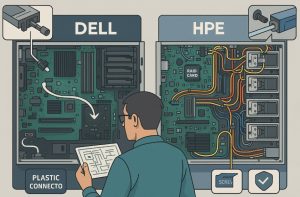When it comes to choosing between HPE and Dell servers, is it simply a matter of brand preference, or are there key differences that should sway your decision?
These two brands are the two biggest names in a market estimated to be worth over $100 billion. Dell and HPE dominate data centers worldwide, and ultimately both provide robust solutions for businesses of all scales.
You may be looking at new hardware or refurbished hardware and want to understand the strengths and weaknesses of both. Here are some top considerations when lining up these two server powerhouses.
Where To Buy Servers?

When it comes to buying servers, you have two main options: purchasing new directly from the manufacturer or an authorised seller, or opting for refurbished units.
Buying new ensures you get the latest models with full warranties and support, but refurbished servers can offer significant savings often at a fraction of the price while still providing similar performance.
Many refurbished units undergo thorough testing and come with their own warranties. You can buy HPE servers and Dell servers at various reputable refurbished seller sites or marketplaces, so be sure to shop around when you decide which brand to go for.
Three Considerations You Need to Factor
1. Support & Firmware Upgrades
When it comes to support and firmware upgrades, Dell has a clear advantage over HPE, especially when it comes to accessibility and ease of use.
Dell provides free updates for its server firmware, making it easier for businesses to stay up to date without additional costs.
In contrast, HPE requires a subscription for firmware updates, which can be a significant drawback, especially for companies looking to minimise long-term expenses.
HPE’s process for accessing firmware updates is more cumbersome users need to register the server through an HPE account and may struggle to find the necessary resources without additional support agreements in place.
Dell, on the other hand, offers a straightforward bootable ISO image that can update all firmware components of PowerEdge servers, including the BIOS and iDRAC, and it’s available directly from their website.
For some businesses, this may be a determining factor, so it is definitely something to consider.
2. Design & Hardware Architecture

When it comes to server design and hardware architecture, Dell and HPE take different approaches. Earlier Dell servers used plastic clips to secure the RAID controller, which over time became brittle and prone to breakage due to heat. However, with their latest models, Dell has made improvements by switching to a more durable screw-on connector.
In terms of cabling, Dell servers typically require fewer connections, making them easier to manage, especially when adding or upgrading drives.
On the other hand, HPE servers tend to require more cables for each drive section, which can make the setup more complex if you’re adding multiple drives. This added complexity can be a factor if you’re looking to build a large or highly customisable system.
If you’re after a simpler option, Dell might be best, but if you’re looking for more customisation and don’t mind dealing with additional cabling, HPE could be a better fit.
3. Costs
Both Dell and HPE have designed their servers with a strong focus on optimising energy use and reducing operating costs, but there are some differences in how they approach this.
Dell servers are generally more affordable, which can make them an attractive choice for businesses looking to reduce upfront costs.
They tend to offer fewer options for price negotiation, but repeat customers or bulk orders can unlock discounts, making them a cost-effective option in the long run.
HPE servers tend to come with slightly higher price tags, but they often provide more flexibility when it comes to negotiating prices.
Despite the higher initial investment, HPE’s emphasis on performance, energy efficiency, and global support makes it a solid choice long-term.
Which Should You Choose For Your Business?
When choosing between Dell and HPE for your business, support structures are an important factor to consider you will utilise them more than you think.
HPE offers centralised global support, which can be ideal for businesses with multiple locations. Dell, however, has a regionally-managed support system, which may lead to variations in service depending on your location.
Both services are reliable, and ultimately it will come down to costs. Dell’s Pro Support is often seen as more cost-effective, with quicker response times. HPE support tends to be pricier but offers similar reliability.
Author Profile

- Blogger by Passion | Contributor to many Business Blogs in the United Kingdom | Fascinated to Write Blogs in Business & Startup Niches |
Latest entries
 FinanceFebruary 26, 2026Centrepay End Dates Make Repayments More Predictable for Centrelink Borrowers
FinanceFebruary 26, 2026Centrepay End Dates Make Repayments More Predictable for Centrelink Borrowers FinanceFebruary 26, 2026Payday Loans Get Better Product Matching Under Target Market Rules
FinanceFebruary 26, 2026Payday Loans Get Better Product Matching Under Target Market Rules CareerFebruary 26, 2026Is Graphic Design a Good Career for the Future?
CareerFebruary 26, 2026Is Graphic Design a Good Career for the Future? FinanceFebruary 7, 2026The Main Types of Online Fundraising Used by Charities
FinanceFebruary 7, 2026The Main Types of Online Fundraising Used by Charities





